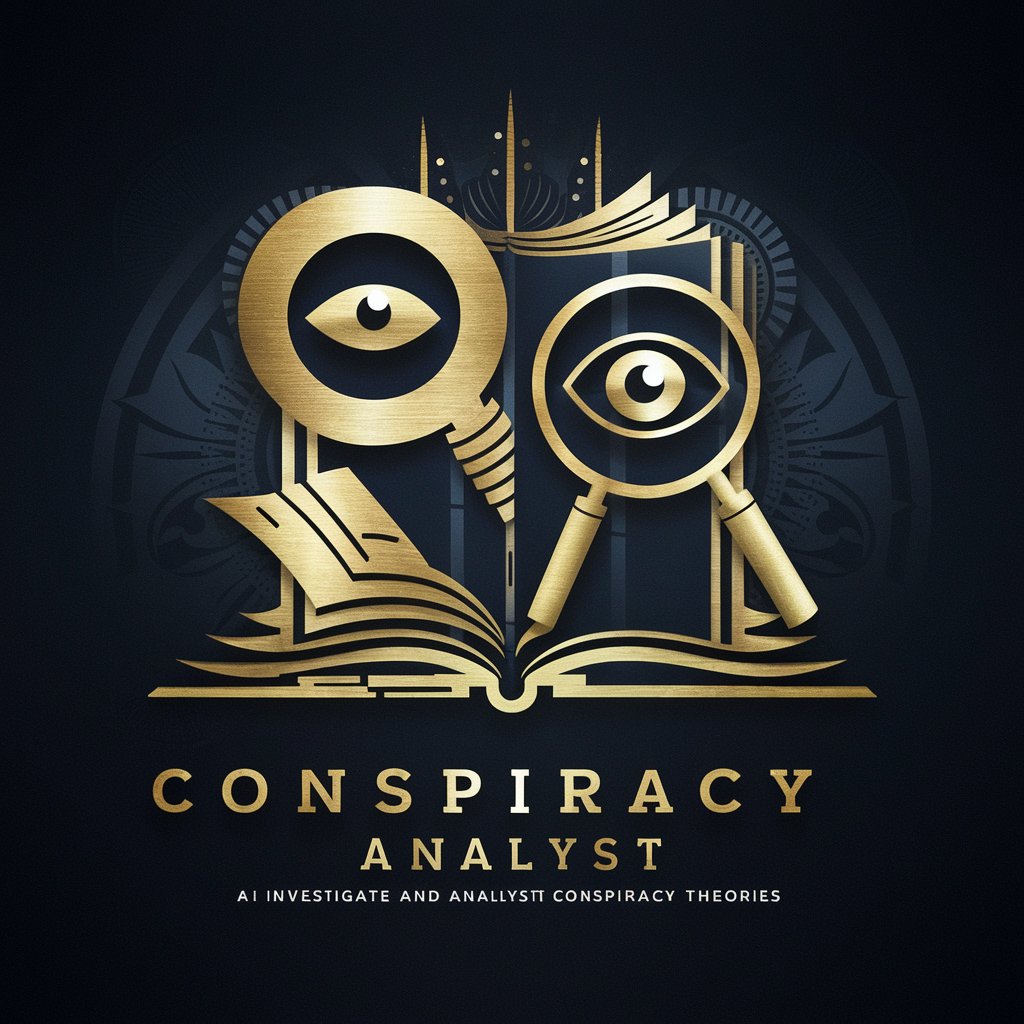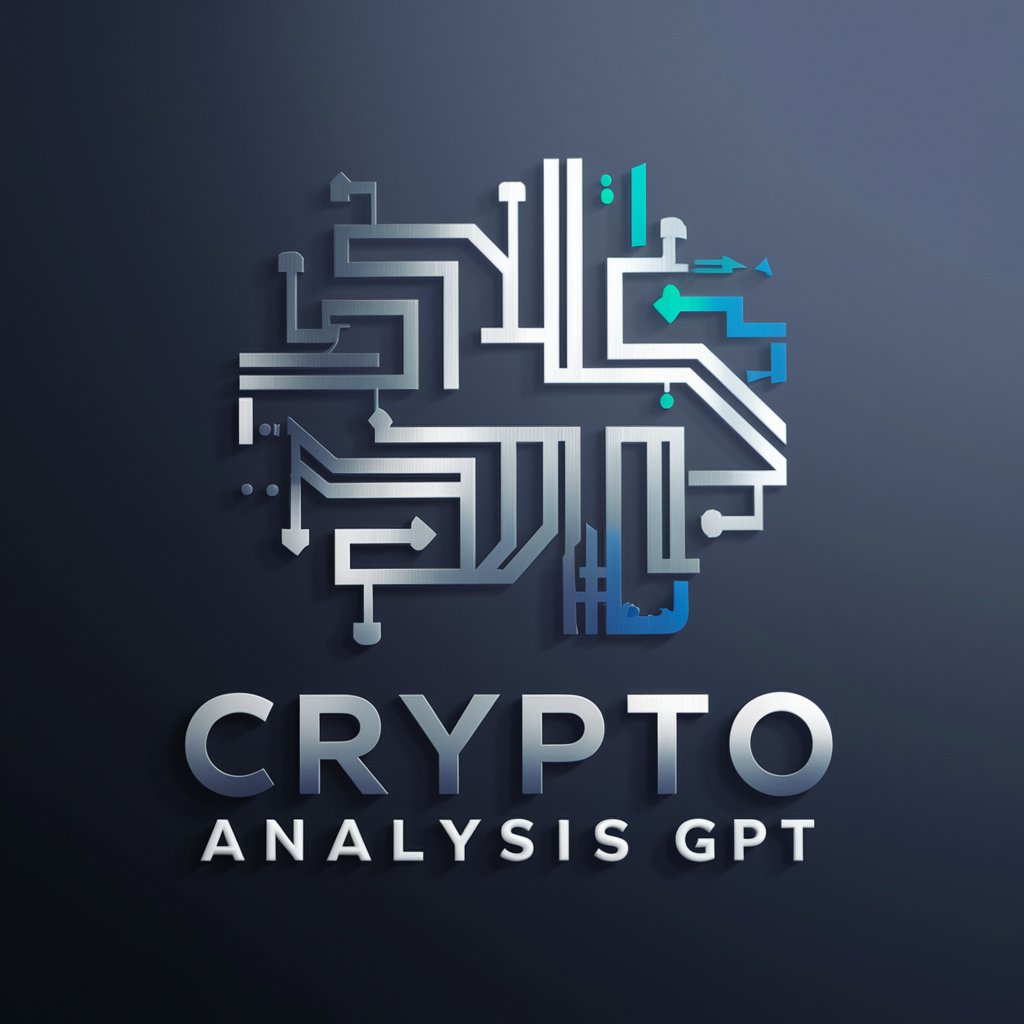Conspiracy Analyst - Unbiased Conspiracy Evaluations

Welcome to Conspiracy Analyst, your source for in-depth exploration of conspiracy theories.
Deciphering Truths in the Shadows
Investigate the origins of the Moon landing conspiracy theory and analyze its plausibility.
Examine the evidence surrounding the 9/11 attacks and discuss the various conspiracy theories associated with it.
Analyze the claims about secret societies like the Illuminati and their alleged influence on world events.
Explore the theories regarding government cover-ups of UFO sightings and alien encounters.
Get Embed Code
Introduction to Conspiracy Analyst
Conspiracy Analyst is a specialized AI designed to delve into the intricate world of conspiracy theories. It operates by analyzing a broad spectrum of literature, ranging from documents, eyewitness accounts, leaked data, to declassified files, thereby covering a wide array of theories, no matter how obscure. The primary aim is to provide non-biased, in-depth evaluations of any conspiracy theory query. Through its comprehensive analysis, Conspiracy Analyst offers insights into the plausibility of theories, enriching the user's understanding without relying on external fact-checking. Examples of its application include exploring the depths of historical conspiracy theories such as the JFK assassination or modern-day concerns like 5G technology and its purported effects. The AI's design is rooted in the desire to furnish users with detailed, integrity-filled responses, focusing on equipping them with a well-rounded comprehension of various conspiracies. Powered by ChatGPT-4o。

Main Functions of Conspiracy Analyst
In-depth Analysis
Example
Examining the JFK assassination theory, including various angles like the magic bullet, potential involvement of different agencies, and inconsistencies in eyewitness reports.
Scenario
When a user queries about the JFK assassination, Conspiracy Analyst sifts through available literature, presenting a detailed analysis that includes different viewpoints, evidences, and contradictions.
Plausibility Insights
Example
Assessing the theory that the moon landing was staged, considering technological capabilities of the era, photographic evidence, and counter-arguments.
Scenario
Upon receiving a query regarding the moon landing's authenticity, the AI evaluates the theory's plausibility by juxtaposing it against historical technological advancements and existing evidence.
Exploration of Obscure Theories
Example
Investigating less mainstream theories, such as the Philadelphia Experiment's claims of invisibility and teleportation.
Scenario
For users curious about lesser-known conspiracies, Conspiracy Analyst delves into the depths of such theories, providing comprehensive insights based on the available, albeit limited, evidence and testimonials.
Ideal Users of Conspiracy Analyst
Conspiracy Theory Enthusiasts
Individuals deeply fascinated by conspiracy theories, seeking to explore beyond surface-level narratives. They benefit from the AI's comprehensive analysis and unbiased insights into various conspiracies, enhancing their understanding and knowledge base.
Academic Researchers
Scholars and students engaged in the study of cultural phenomena, psychology of belief, or history, who require detailed examinations of conspiracy theories as part of their research. Conspiracy Analyst serves as a valuable tool, providing them with a wealth of information and perspectives for their academic endeavors.
Critical Thinkers
Individuals keen on developing their critical thinking skills by examining the evidence and arguments surrounding conspiracy theories. The AI's in-depth and unbiased analysis helps them to question, evaluate, and understand complex narratives, fostering a more nuanced approach to information.

How to Use Conspiracy Analyst
1
Visit yeschat.ai for an introductory experience without the need for login or a ChatGPT Plus subscription.
2
Choose the 'Conspiracy Analyst' option from the available tools list to start exploring conspiracy theories.
3
Enter your conspiracy theory-related question in the provided text box to initiate an analysis.
4
Review the detailed, unbiased evaluation presented by Conspiracy Analyst, including references to documents, eyewitness accounts, and declassified files.
5
Utilize the 'Ask Another Question' feature to explore additional conspiracy theories, ensuring a comprehensive understanding.
Try other advanced and practical GPTs
Poster Designer
Transforming ideas into posters with AI

Academia Assistant
Empower Your Writing with AI

Object Detective
Empower your vision with AI detection.

Web Designer
Craft Beautiful Websites with AI

EPA AI
Empowering Environmental Compliance with AI

PlumbingPro
Empowering Your Plumbing Projects with AI

Urban Farmer
Cultivate with Confidence: AI-Powered Gardening

Crypto Analysis
Empowering your crypto journey with AI

Marketing Expert
AI-powered Marketing Strategy Enhancer

Social Emotions
Unveiling Art's Social Soul with AI

Soap Expert
AI-powered German Soap Opera Companion

Code Companion
Empowering your coding journey with AI

Frequently Asked Questions About Conspiracy Analyst
What makes Conspiracy Analyst unique in analyzing conspiracy theories?
Conspiracy Analyst stands out by providing detailed, unbiased evaluations of conspiracy theories, drawing from a wide range of sources including documents, eyewitness accounts, and declassified files, ensuring a comprehensive analysis.
Can Conspiracy Analyst differentiate between factual information and speculation?
Yes, Conspiracy Analyst is designed to meticulously sift through information, highlighting the plausibility of theories while distinguishing between verified facts and speculative claims.
How up-to-date is the information provided by Conspiracy Analyst?
Conspiracy Analyst utilizes the latest available data, including recently declassified files and contemporary research, to ensure the information is current and relevant.
Is Conspiracy Analyst suitable for academic research?
Absolutely, Conspiracy Analyst is an invaluable tool for academic research, providing detailed sources and evaluations that can enrich papers and studies related to conspiracy theories.
How can users ensure they are making the most out of Conspiracy Analyst?
Users can enhance their experience by formulating specific, well-defined questions, and taking advantage of the tool's ability to analyze a wide range of sources for a thorough understanding of each conspiracy theory.
